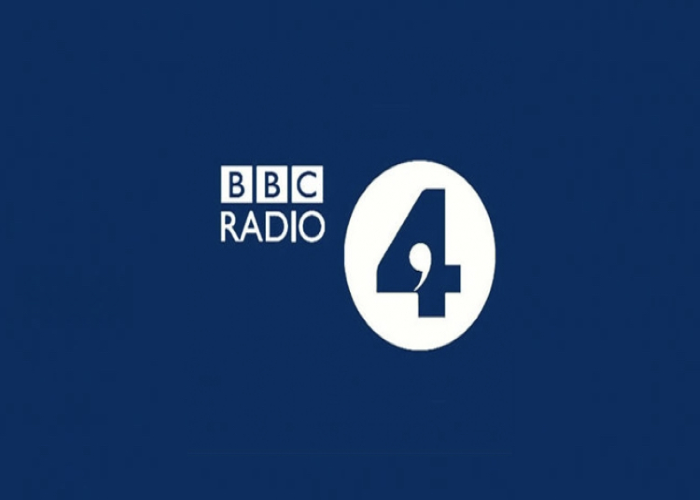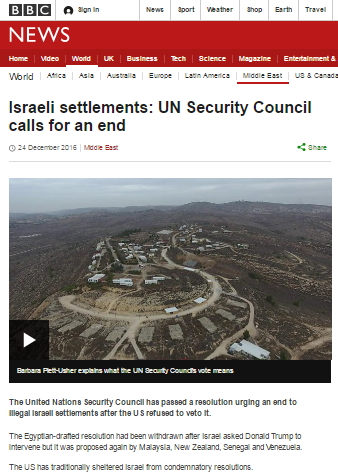Previously we looked at BBC World Service radio’s insertion of the topic of human rights in Bahrain into reporting on the announcement of normalisation of relations between that country and Israel.
Another trend seen in some of the media coverage of the Abraham Accords has been the claim that they provide political boosts for the US president and the Israeli prime minister. As noted by Lahav Harkov at the Jerusalem Post:
“There is merit to this criticism, as this deal has major political advantages for both. […]
However – and this is a major caveat – the political benefits for Trump and Netanyahu only go so far.
For Netanyahu, the timing could not be worse, as Israel heads to a three-week lockdown to try to curb the rise of coronavirus morbidity. […]
And while Trump may have hoped this would distract from coronavirus, it didn’t exactly work. The chyron across the bottom of the screen on CNN during the signing ceremony noted the crowds and lack of masks. […]
Plus, the economy is the No. 1 election issue in the US. Foreign policy is low on that list. This is unlikely to actually move the dial very much for Trump.”
An additional aspect of commentary on the story has been the topic of the break with the 2002 Saudi initiative proposal of normalisation of relations between Israel and Arab states in exchange for resolution of the Palestinian-Israeli conflict – described thus by Shany Mor:
“The experts told us that no Arab-Israeli peace was possible without first settling the Palestinian issue. Years and years of Palestinian rejection of peace deals did not wear down the certainty that Israel was at fault, but they did wear down the patience of some Arab states who didn’t want their entire foreign policies hostage to a revenge fantasy.”
Those two talking points were in evidence in BBC Radio 4 coverage of the signing of the Abraham Accords on September 15th.
The station’s early morning news and current affairs programme ‘Today’ featured a report (from 11:02 here) introduced by presenter Mishal Husain: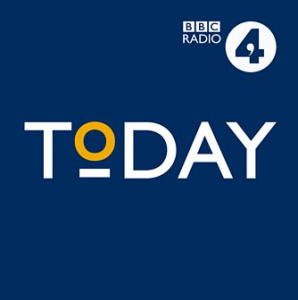
Husain: “At the White House later today an agreement to normalise relations between Israel and the UAE and Bahrain will be signed. It marks a historic shift in relations between the Jewish state and two Arab countries but it comes amid a crisis at home for the Israeli leader.”
The subsequent report by the BBC Jerusalem bureau’s Tom Bateman commenced with an Israeli model filming an advert for pyjamas in Dubai before moving on to the topic of demonstrations in Israel. [emphasis in italics in the original, emphasis in bold added]
Bateman: “But these Israelis are sounding off about something else. With their PM signing agreements in Washington, they’re facing a second lockdown at home. Israel is deep in a health and economic crisis; a country divided over its leader who faces a corruption trial. […] Amid the chaos, the Gulf deal brings a glimmer of deliverance for Mr Netanyahu.”
Later on in his report Bateman repeated what has been one of the BBC’s main talking points ever since this story began:
Bateman: “But for Palestinians the Gulf countries’ deal with Israel is a betrayal. They think it breaks years of Arab solidarity over their hopes for an end to military occupation. Countries in the region had offered formal ties with Israel only once Palestinian statehood was achieved. In Jerusalem’s Old City, Husain Javis [phonetic] heads to noon prayers at the al Aqsa Mosque. Could Emiraties and Bahrainis soon be joining him?”
Voiceover: “The Emirati people are a Muslim nation. Anybody from around the Muslim world has the right to come and pray in al Aqsa. It is these regimes that have abandoned their responsibility and give up on the cause of al Aqsa.”
Failing to address his interviewee’s different portrayal of the aim of “Arab solidarity”, Bateman closed his report:
Bateman: “President Trump will applaud his strategy for the region at today’s signing ceremony in Washington. As Mr Netanyahu puts pen to paper, his troubles at home are also being written into his legacy.”
Later on in the same programme the same talking points were raised again by Yolande Knell of the BBC’s Jerusalem bureau in a news bulletin (1:06:44).
Knell: […] “Washington now hopes to persuade other Arab states to normalise relations with Israel, although the Palestinians have urged them not to while their conflict remains unsolved. For Mr Trump, in the midst of an election campaign, this event marks a key foreign policy victory.”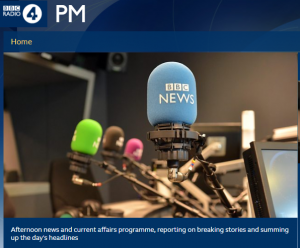
At 5 p.m. on September 15th, listeners to the BBC Radio 4 programme ‘PM’ heard an introduction from presenter Evan Davis (from 44:36 here) which focused on the first of those talking points.
Davis: “All American presidents like to score a big perceived foreign policy achievement – one that might get them the Nobel Prize or something – and President Trump has something today. A signing ceremony is underway at the White House in which Israel, the United Arab Emirates and Bahrain are normalising relations. […] Well it’s useful in the run-up to November’s election for the president and it looks like a good day to look back at his foreign policy and whether he has much to show for it.”
An hour later, listeners to BBC Radio 4’s ‘Six O’Clock News’ heard almost four minutes of comment (from 16:48 here) on the same story.
Newsreader: “Within the last few minutes a ceremony to mark the signing of a US-brokered peace deal between Israel, the United Arab Emirates and Bahrain has taken place at the White House. All three countries have called the deal historic and Washington is keen to highlight President Trump’s role in the run-up to November’s election. Here’s our North America editor Jon Sopel.”
Jon Sopel provided some rather mixed messaging on that latter point:
Sopel: “For Donald Trump, now less than two months out from the presidential election, this is a significant foreign policy victory; all the sweeter because so many detractors scoffed at his attempts to be a peacemaker for the region. But it would be wrong to look at this through the lens of internal US politics. This agreement is bigger than that. Donald Trump has expressed optimism that other countries might follow. And though the president has a track record of being overly optimistic, a few months ago who’d have imagined this signing taking place today?”
That was followed by a ‘creative’ portrayal of the 2002 Saudi initiative: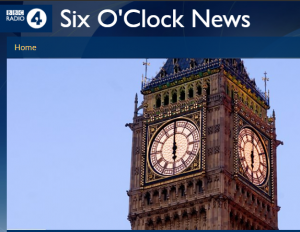
Newsreader: “The deal marks a shift in a long-held position where Arab countries have tried to maintain unity against Israel because of its treatment of the Palestinians. With his assessment of what it means for the wider peace process, here’s our Middle East editor Jeremy Bowen.”
The analysis given by Jeremy Bowen bore close resemblance to his article published on the BBC News website on the same day, including his interpretation of Jabotinsky’s ‘Iron Wall’ essay.
Bowen: “This is a victory for those Israelis like Prime Minister Netanyahu who believe in the Iron Wall. The idea, first expressed in the 1920s by a mentor of Mr Netanyahu’s father, is that unbending Jewish strength will make the Arabs realise that they have no choice other than to accept the existence of their state. […]
Saudi Arabia […] has signaled its approval of the deal by allowing Bahrain, which it dominates, to join in. But it’s unlikely that the Saudis will normalise relations with Israel, at least while King Salman is alive. His son and heir, crown prince Mohammed might feel differently. The reason is that King Salman still seems to believe in the Arab peace plan which was launched by his late brother two decades ago. It calls for independence for the Palestinians as the price for Arab recognition of Israel. The UAE says it has stopped Israel annexing Palestinian land. The accord though has broken the Arab consensus on Israel and the Palestinians. The Palestinians say they have been betrayed. Iran does not like the new cohesion in the alliance against them. But the Palestinians are the biggest losers; more isolated and weaker than ever.”
One of course presumes that the BBC’s Middle East editor is fully aware of the fact that the parts of Area C to which the proposal to apply Israeli civilian law related are, under the terms of the Oslo Accords, subject to final negotiations, were previously occupied by Jordan and were never the territory of a Palestinian state.
As we see, throughout the day’s coverage of the signing of the Abraham Accords BBC Radio 4 failed to bring its audiences voices representing any of the three parties to those agreements. Instead listeners heard repeated promotion of talking points concerning the upcoming US election (without any serious examination of the question of whether US voters will be influenced by the event) along with messaging (also promoted by the PLO) concerning a perceived breach of one aspect of the Saudi initiative and resulting Palestinian ‘isolation’. Interestingly, none of the BBC’s reporters or expert commentators bothered to raise the topic of what has happened since that 2002 initiative (including Palestinian rejection of a peace offer six years later and the Hamas-Fatah split) or why attitudes in some Arab states have changed.
Related Articles:
BBC WORLD SERVICE RADIO COVERAGE OF THE BAHRAIN-ISRAEL AGREEMENT
JEREMY BOWEN’S RECOMMENDED READING ON THE ABRAHAM ACCORDS

